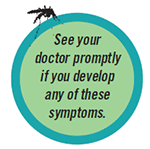
What is West Nile virus?
West Nile Virus (WNV) is a mosquito borne virus that can cause severe illness including encephalitis (swelling of the brain) and can sometimes result in long term complications and death. The risk of WNV varies from year to year based on precipitation, temperature, mosquito populations and other factors.
IT ONLY TAKES A SINGLE BITE FROM AN INFECTED MOSQUITO TO CONTRACT WNV.
- See the latest Surveillance Statistics
- See the Weekly Update
Who is at risk?
In southern Manitoba, anyone can be exposed to an infected Culex tarsalis mosquito from June to September. The highest risk period occurs when the infected mosquito populations are greatest, typically from mid July through the end of August. Individuals spending time outdoors at work (ex: construction, farming etc), or recreationally (ex: gardening, golfing, at the cottage) are at greater risk of exposure.
Cooler temperatures and forested habitat combine to create a small WNV risk in northern Manitoba. However the WNV risk may be increased around pockets of agricultural land in the north during very warm years.
While the WNV risk to northern Manitobans is normally quite low, residents are strongly encouraged to take appropriate precautions when visiting southern Manitoba where the risk of WNV is often much greater.
What are the symptoms?
While some people who get WNV show no symptoms and do not become ill, others may show mild symptoms such as headache, fever, fatigue and body aches.
Severe illness has occurred in all age groups. However, severe illness has occurred more commonly in older adults and persons with weakened immune systems. Recovery from these severe symptoms can take months or years.
Severe WNV Symptoms:
|
 |
THERE IS NO VACCINE, CURE OR SPECIFIC TREATMENT FOR WNV.
What can I do to protect myself?
PREVENTION IS THE FIRST LINE OF DEFENCE AGAINST WEST NILE VIRUS.
- Apply an appropriate insect repellent when outdoors and follow the instructions on the label.
- Wear light coloured, loose-fitting clothing with long sleeves and pant legs while outdoors.
- Reduce time spent outdoors between dusk and dawn.
- Make sure your doors and window screens fit tightly and are free of holes.
- Reduce the mosquito habitat around your home by regularly cleaning and emptying water holding containers such as bird baths, wading pools, childrens toys, eavestroughs, tarp covers and plant trays.
- Ensure that rain barrels are covered with a fine screen and tightly sealed around the downspout.
- Clean your yard of old tires, empty flower pots, buckets and any other debris where water collects.
- Keep grass mowed and vegetation trimmed around high use areas (ex: doorways & seating areas).
As of May 2013, Health Canada has approved the following active ingredients to be safe and effective mosquito repellents:
- DEET (no more than 30% strength)
- Icaridin (Picaridin)
- Oil of Lemon Eucalyptus (p-methane-3, 8 diol)
- Soybean Oil
Always follow the instructions on the label; application rates may vary by age.
For WNV health concerns, contact your doctor or call:
Health Links - Info Santé
204-788-8200 (Winnipeg) or toll-free 1-888-315-9257


